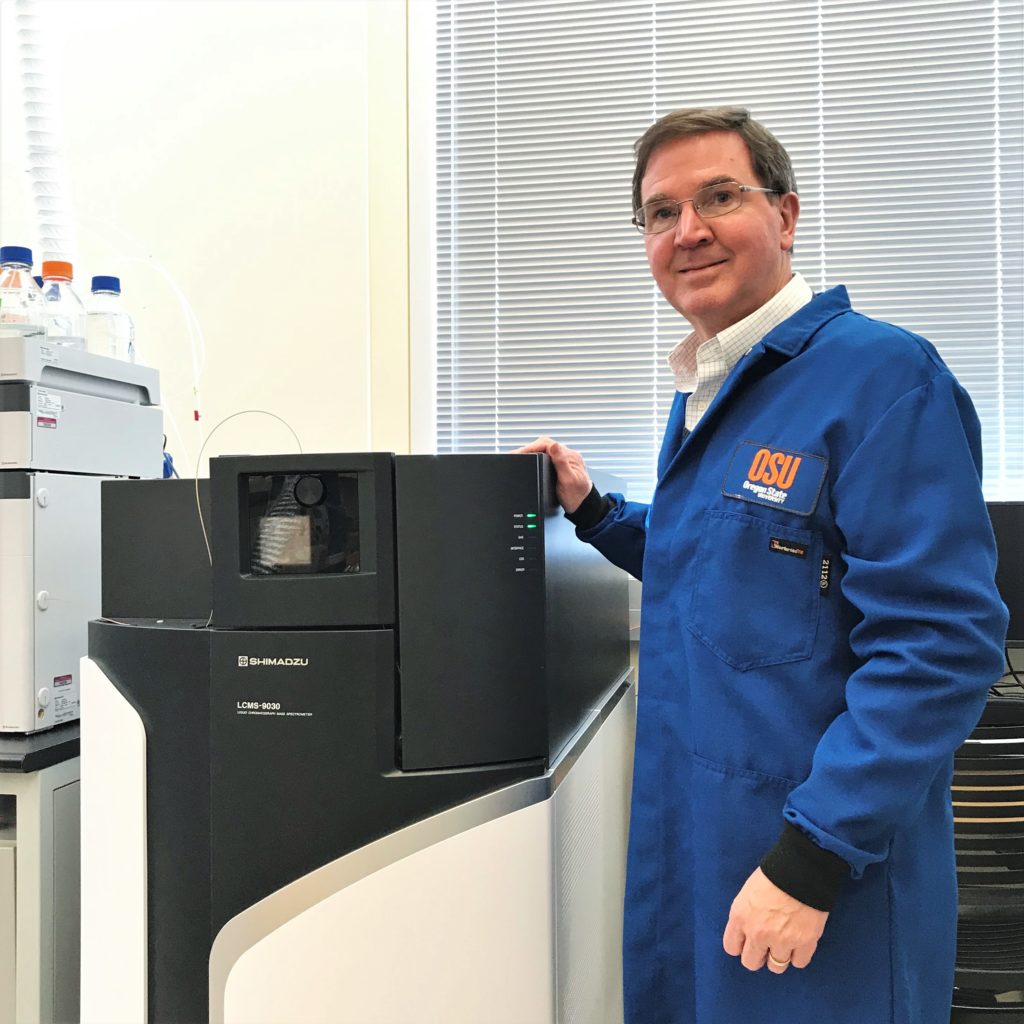“To study the phenomenon of disease without books is to sail an uncharted sea, while to study books without patients is not to go to sea at all.“
Sir William Osler (1849 – 1919)
Interview by Dr. Michael Mosley on BBC Radio 4 program Just One Thing featuring Dr. van Breemen’s research on lycopene and tomatoes
This 15-minute program is available for listening here https://www.bbc.co.uk/sounds/play/m001r1ms and downloading here https://www.bbc.co.uk/programmes/m001r1ms

Dr. van Breemen receives OSU Impact Award for Outstanding Scholarship for research on hemp and SARS-CoV-2

Dr. van Breemen named one of top 100 analytical scientists for contributions made during the last 10 years

https://theanalyticalscientist.com/power-list/2023
Dr. van Breemen will be giving a talk at the Oregon State University’s Science Pub event at 6 p.m. Dec. 6. The title will be Natural products and hemp: Under-appreciated sources for COVID-19 therapeutic agents. This event will be open to the public and you can register for a virtual or in-person experience.
For more information about the event, please visit the OSU newsroom.
Last week, Dr. van Breemen gave a presentation at a webinar hosted by the American Chemical Society concerning advances in the understanding the chemistry and biology of SARS-CoV-2. The webinar is now available on demand at https://go.acs.org/ACSFrontlineCoronavirus.
Research featured at OSU Newsroom
Dr. Richard van Breemen, Dr. Ruth Muchiri, and collaborators from Oregon Health & Sciences University published the findings from their affinity selection-mass spectrometry (ASMS) screening assay. The research shows how natural products found in hemp may be able to prevent as well as treat COVID-19, and that these hemp compounds are equally effective against the new variants of the virus.
Two cannabinoids, cannabigerolic acid (CBGA) and cannabidiolic acid (CBDA), are discovered to bind to the SARS-CoV-2 spike protein, blocking a critical step in the infection process. Unlike other cannabinoids that have psychoactive properties, these two compounds are not controlled substances and have a good safety profile in humans.
The press release can be found here.
Oregon State research shows hemp compounds prevent coronavirus from entering human cells
Cannabinoids can Prevent Coronavirus from Entering Human Cells

The van Breemen Laboratory published a paper in the Journal of Natural Products showing how cannabinoids, isolated or in hemp extracts, have the potential to prevent as well as treat infections by SARS-CoV-2.
These botanical compounds that interact with the SARS-CoV-2 spike protein were discovered using our affinity selection-mass spectrometry technology.
A PDF of this paper is available to public.
Dr. van Breemen Named One of the Top 10 Analytical Science Experts in North America in 2020
In The Analytical Scientist, Dr. Richard van Breemen was named one of the winners of the Power List of 2020. Ten scientists were picked from each continent, and each has a story to tell.
Congratulations, Dr. van Breemen!
A PDF of this is available below.

Goodbyes and Welcome!
Congratulations to Dr. Daniel Nosal and Dr. Luying Chen on achieving your doctorate. Daniel will continue as a postdoctoral researcher at our laboratory. Luying is starting her new job as a Senior Scientist at Novartis Global Drug Development.
We wish you success in your future endeavors.
Margaret Redick is joining us for Fall Semester of 2020. She will be working on a project to do high-throughput screening of natural product extracts and combinatorial libraries using magnetic microbead affinity selection screening (MagMASS).
Welcome to Oregon State University, Maggie!
Hops-based Supplements and Women’s Health
An article on Everyday Health features the work by our laboratory group on Hops Dietary Supplement. Our study shows no significant drug interactions in women taking hops to control hot flashes.
Celebrating Linus Pauling Day

In celebration of Linus Pauling Day, Dr. van Breemen was interviewed by Dr. John Westerdahl on LifeTalk Radio.
Linus Pauling is one of the most famous scientists born and raised in Oregon. February 28th is Linus Pauling’s birthday, which the Governor declared as a local holiday in the state of Oregon.
Linus Pauling was a career long academician and teacher, and it is the mission of the Linus Pauling Institute to train the next generation of scientists in the prevention of diseases of aging – a tradition that Pauling created with this Institute. The full interview is available for download.
- Dr. John Westerdahl is a nutritionist and board certified anti-aging health practitioner. He is also the radio host for the program Health & Longevity.
A landmark literature of 2019 featured in The Analytical Scientists magazine
When Luying was developing an assay to study how botanical dietary supplements may affect drug metabolism, she identified and reported a widespread presence of drugs in samples of “supposedly” pure human serum. These include: caffeine, alprazolam (an anti-anxiety medicine), and dextromethorphan (an cough suppressant).
The Truth About Transfusions
Dr. Catherine Fenselau, Distinguished University Professor Emeritus, University of Maryland
Her measurements were made following FDA guidance for pharmacological studies, using stable isotope labeled internal standards and ultrahigh performance liquid chromatography tandem mass spectrometry (UHPLC-MS/MS) on a Shimadzu triple quadrupole mass spectrometer.
She tested 18 lots of human serum from North American sources – all of which contained caffeine (as high as 250 ng/mL), 13 contained alpraxolam, and 8 contained dextromethorphan. Two individual donors had to be recruited to abstain from caffeinated foods and beverages to complete her assay validation.

- article from The Analytical Scientist magazine
- featured landmark paper by Luying Chen and Dr. Richard van Breemen.
Validation of a sensitive UHPLC-MS/MS method for cytochrome P450 probe substrates caffeine, tolbutamide, dextromethorphan, and alprazolam in human serum reveals drug contamination of serum used for research.
J Pharm Biomed Anal. 2020 Feb 5;179:112983. doi: 10.1016/j.jpba.2019.112983
